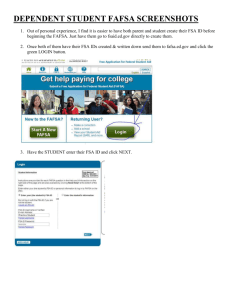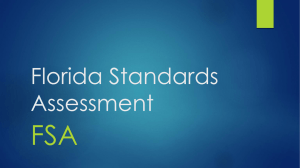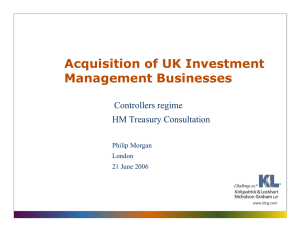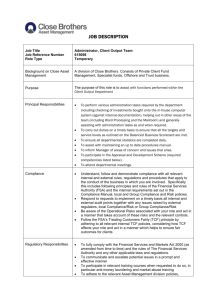Alert K&LNG Hedge Funds FSA Consultation on Hedge Fund Regulation
advertisement
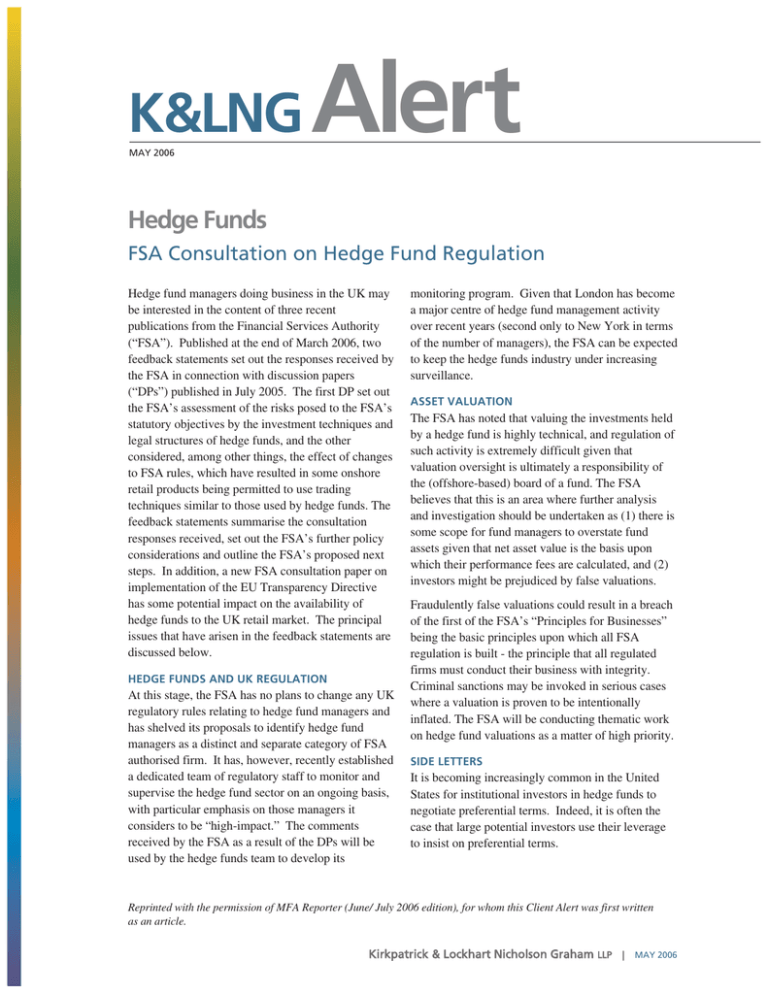
K&LNG MAY 2006 Alert Hedge Funds FSA Consultation on Hedge Fund Regulation Hedge fund managers doing business in the UK may be interested in the content of three recent publications from the Financial Services Authority (“FSA”). Published at the end of March 2006, two feedback statements set out the responses received by the FSA in connection with discussion papers (“DPs”) published in July 2005. The first DP set out the FSA’s assessment of the risks posed to the FSA’s statutory objectives by the investment techniques and legal structures of hedge funds, and the other considered, among other things, the effect of changes to FSA rules, which have resulted in some onshore retail products being permitted to use trading techniques similar to those used by hedge funds. The feedback statements summarise the consultation responses received, set out the FSA’s further policy considerations and outline the FSA’s proposed next steps. In addition, a new FSA consultation paper on implementation of the EU Transparency Directive has some potential impact on the availability of hedge funds to the UK retail market. The principal issues that have arisen in the feedback statements are discussed below. HEDGE FUNDS AND UK REGULATION At this stage, the FSA has no plans to change any UK regulatory rules relating to hedge fund managers and has shelved its proposals to identify hedge fund managers as a distinct and separate category of FSA authorised firm. It has, however, recently established a dedicated team of regulatory staff to monitor and supervise the hedge fund sector on an ongoing basis, with particular emphasis on those managers it considers to be “high-impact.” The comments received by the FSA as a result of the DPs will be used by the hedge funds team to develop its monitoring program. Given that London has become a major centre of hedge fund management activity over recent years (second only to New York in terms of the number of managers), the FSA can be expected to keep the hedge funds industry under increasing surveillance. ASSET VALUATION The FSA has noted that valuing the investments held by a hedge fund is highly technical, and regulation of such activity is extremely difficult given that valuation oversight is ultimately a responsibility of the (offshore-based) board of a fund. The FSA believes that this is an area where further analysis and investigation should be undertaken as (1) there is some scope for fund managers to overstate fund assets given that net asset value is the basis upon which their performance fees are calculated, and (2) investors might be prejudiced by false valuations. Fraudulently false valuations could result in a breach of the first of the FSA’s “Principles for Businesses” being the basic principles upon which all FSA regulation is built - the principle that all regulated firms must conduct their business with integrity. Criminal sanctions may be invoked in serious cases where a valuation is proven to be intentionally inflated. The FSA will be conducting thematic work on hedge fund valuations as a matter of high priority. SIDE LETTERS It is becoming increasingly common in the United States for institutional investors in hedge funds to negotiate preferential terms. Indeed, it is often the case that large potential investors use their leverage to insist on preferential terms. Reprinted with the permission of MFA Reporter (June/ July 2006 edition), for whom this Client Alert was first written as an article. Kirkpatrick & Lockhart Nicholson Graham LLP | MAY 2006 Investment in a hedge fund is governed by the fund's underlying organisational documents, and any variation to these established terms must be done by way of a written agreement or side letter. Each side letter is entered into between the fund and an individual investor, and the FSA believes that entering into such side letters with some but not all investors of the same class may be to the detriment of other investors in that class who should be aware that side letters can affect the risk profile of their hedge fund investment. This lack of transparency and a lack of disclosure regarding side letters deprives the other investors of access to comprehensive information. The FSA warns that failing to disclose the existence of side letters to every investor in a particular class could, as with false valuations, amount to a breach of Principle 1 by the FSA-regulated manager—i.e., it is not conducting its business with integrity. Although there are no specific SEC rules on side letters, the SEC staff has stated informally that the unequal sharing of information with investors in a hedge fund may be improper in certain circumstances. As a consequence, many U.S. hedge funds now disclose in their offering documents that certain investors may be provided more detailed information and/or that certain investors may be given preferential terms. In any event, if material information is provided to some investors, the hedge fund may be forced to share that information with other investors in a timely manner. There are also no specific UK rules at all on side letters beyond the general principles, but the FSA has stated that as a minimum it would expect acceptable market practice to be for managers to ensure that all investors are informed when a side letter is granted (but not the nature of the individual agreement). The FSA has also indicated that it will review a sample of firms' practices to further inform its policy thinking on side letters. RETAIL INVESTMENT PRODUCTS The second FSA feedback statement mainly concerns the risks posed to the UK’s financial markets by investment products that have some of the characteristics of hedge funds. In response to the comments it has received from the financial services industry, the FSA has proposed that, with regard to such “complex” investment products, it will reinforce its existing consumer information and awareness work, look more closely at the question of product provider responsibility, and potentially extend the range of products available to the retail market. 2 In particular the FSA has been considering whether it should introduce a new unlisted authorised fund of hedge funds product which could be marketed to the UK general public. The FSA has suggested that investor protection in relation to these proposed products should, in part, be provided by requiring that the fund manager be domiciled in the UK, and hence subject to FSA rules. The FSA is further considering investor protections in this area by assessing whether concentration and risk spreading restrictions would provide sufficient control and protection for consumers. The FSA has stated that it will issue a consultation paper on this matter although as yet no date for the consultation has been published. In addition, a new FSA consultation paper published on 30 March 2006 (concerning how the FSA proposes to implement the EU Transparency Directive) contains a further proposal to extend the range of products available to the UK general public. The suggestion is that for the first time, investment entities using a wider range of investment strategies, such as hedge funds, would be able to list their shares on a UK exchange and market to the UK general public. (N.B. Funds of hedge funds are, subject to listing rule restrictions, already able to be admitted to listing on a UK exchange and similarly marketed). Although the details are not yet available, and the FSA has stated that a further consultation paper will be issued on this subject in the near future, it seems likely that the first hedge funds that will be listed will be those that follow a single strategy. The FSA has stated however that listed hedge funds would be subject to a “robust listing regime” with “enhanced disclosure requirements.” The FSA states in the consultation paper that “there is an inevitable trend towards increased variety of products” and the FSA’s regulatory response to this will be to rely on consumer education and awareness as the principal tool for the protection of consumers, rather than attempting to restrict the variety of products available for investors. Provided there is sufficient disclosure to shareholders of the risks associated with investing in an investment entity exposed to a particular asset class or investment strategy, and entities continue to satisfy the requirement to spread investment risk, then the FSA sees no reason why shareholders should not be free to invest. Kirkpatrick & Lockhart Nicholson Graham LLP | MAY 2006 For investors, if single strategy hedge funds were eligible to be listed, a greater degree of liquidity should result. Hedge fund shares are usually illiquid investments, and to the extent that, in the future, listed, closed-ended hedge funds are established, this could increase the level of liquidity in the industry, creating perpetual vehicles that investors can trade in and out of more easily. The Feedback Statements can be downloaded from: http://www.fsa.gov.uk/pubs/discussion/fs06_02.pdf http://www.fsa.gov.uk/pubs/discussion/fs06_03.pdf The Transparency Directive consultation paper can be downloaded from: http://www.fsa.gov.uk/pubs/cp/cp06_04.pdf The FSA will consult further on these proposals in the course of 2006 and 2007. Philip Morgan +44.20.7360.8123 pmorgan@klng.com Neil Robson +44.20.7360.8130 nrobson@klng.com If you have questions or would like more information about K&LNG’s Hedge Fund Practice, please contact one of our lawyers listed below, or send general inquiries via e-mail to hedgefunds@klng.com. BOSTON Mark P. Goshko Nicholas S. Hodge LONDON Philip J. Morgan 617.261.3163 mgoshko@klng.com 617.261.3210 nhodge@klng.com +44.20.7360.8123 pmorgan@klng.com LOS ANGELES William P. Wade 310.552.5071 wwade@klng.com NEW YORK Beth R. Kramer Richard D. Marshall 212.536.4024 bkramer@klng.com 212.536.3941 rmarshall@klng.com SAN FRANCISCO David Mishel Mark D. Perlow 415.249.1015 dmishel@klng.com 415.249.1070 mperlow@klng.com WASHINGTON Cary J. Meer 202.778.9107 cmeer@klng.com Robert H. Rosenblum 202.778.9464 rrosenblum@klng.com www.klng.com BOSTON • DALLAS • HARRISBURG • LONDON • LOS ANGELES • MIAMI • NEWARK • NEW YORK • PALO ALTO • PITTSBURGH • SAN FRANCISCO • WASHINGTON Kirkpatrick & Lockhart Nicholson Graham (K&LNG) has approximately 1,000 lawyers and represents entrepreneurs, growth and middle market companies, capital markets participants, and leading FORTUNE 100 and FTSE 100 global corporations nationally and internationally. K&LNG is a combination of two limited liability partnerships, each named Kirkpatrick & Lockhart Nicholson Graham LLP, one qualified in Delaware, U.S.A. and practicing from offices in Boston, Dallas, Harrisburg, Los Angeles, Miami, Newark, New York, Palo Alto, Pittsburgh, San Francisco and Washington and one incorporated in England practicing from the London office. This publication/newsletter is for informational purposes and does not contain or convey legal advice. The information herein should not be used or relied upon in regard to any particular facts or circumstances without first consulting a lawyer. Data Protection Act 1988—We may contact you from time to time with information on Kirkpatrick & Lockhart Nicholson Graham LLP seminars and with our regular newsletters, which may be of interest to you. We will not provide your details to any third parties. Please e-mail cgregory@klng.com if you would prefer not to receive this information. © 2006 KIRKPATRICK & LOCKHART NICHOLSON GRAHAM LLP. ALL RIGHTS RESERVED.
